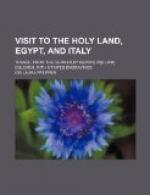The temple of Marcus Aurelius is converted into the Dogana. That of Minerva Medica lies in the midst of a vineyard, and is built in the form of a rotunda. The upper part has sunk in.
There are twelve obelisks in the different public squares of Rome, all brought from Egypt.
I have still to mention the 108 fountains, from which fresh water continually spouts into the air. Foremost among them in size and beauty is the Fontana Trevi.
I was prevented by the bad weather from making trips to any distance, but one afternoon I drove to Tivoli. The road leading thither is called the Tiburtinian. After travelling for about six miles we become conscious of a dreadfully offensive sulphurous smell, and soon find that it proceeds from a little river running through the Solfatara. A ride of eighteen Italian miles brought us to the town of Tivoli, lying amidst olive-woods on the declivity of the Apennines, and numbering about 7000 inhabitants. Towards evening I took a short walk in the town, beneath the protection of an umbrella, and was not much pleased. Next morning I left the house early, and proceeded first to the temple of Sybilla, built on a rock opposite to the waterfall. Afterwards I went to view the grotto of Neptune, and that through which the Arno flows, rushing out of the cavern to fall headlong over a ledge of lofty rocks, and form the cascade of Tivoli. The best view of this fall is obtained from the bridge. Besides many pretty minor cascades, I saw a number of ruins; the most remarkable among these was the villa of Mecaenas.
November 23d.
At six o’clock this morning I commenced my journey to Florence with a Veturino. Almost the whole distance the weather was in the highest degree unfavourable—it was foggy, rainy, and very cold. A journey through Italy during autumn or winter is far from agreeable; for there are generally cold and rain to be encountered, and no warm rooms to be found in the inns, where fires are never kindled until after the guests have arrived. And the fires they light in the grates are, after all, quite inadequate to warm the damp, unaired rooms, and the traveller feels scorched and cold almost at the same moment. The floors are all of stone, but a few straw-mats are sometimes spread beneath the dining-tables.
The landscape through which we travelled to-day did not possess many attractions. For about forty miles, as far as Ronciglione, we saw neither town nor village. The aspect of Ronciglione is rather melancholy, though it boasts a broad street and many houses of two stories. But the latter all have a gloomy look, and the town itself appears to be thinly populated. We passed the night here.
According to Italian custom, I had made a bargain with the proprietor of our vehicle for the journey, including lodging and board. I was well satisfied, for he strictly kept his contract. But whoever expects more than one meal a day under an arrangement of this sort will find himself grievously mistaken; the traveller who wishes to take any thing in the morning or in the middle of the day must pay out of his own pocket. I found every thing here exceedingly expensive and very bad.




